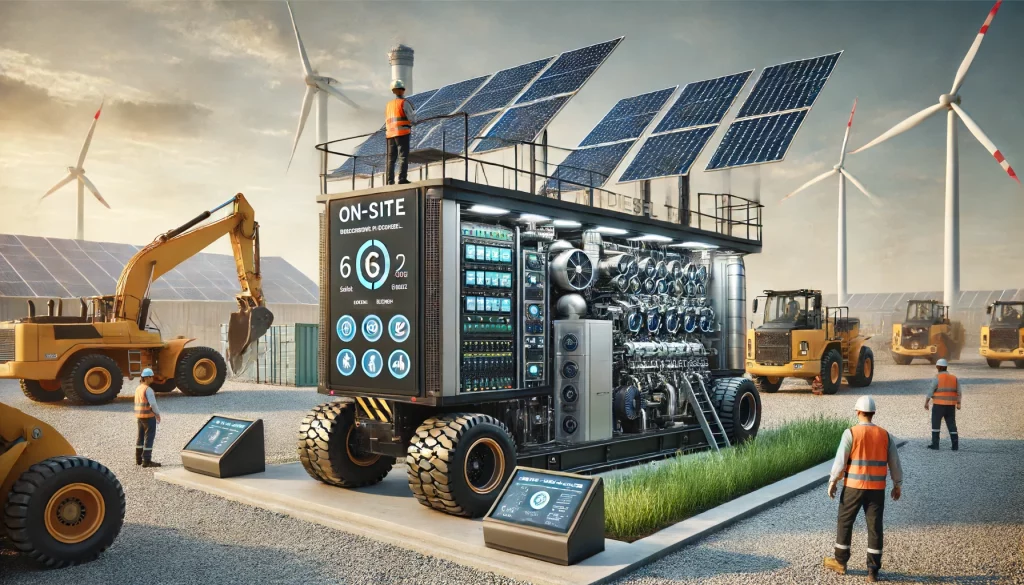The Evolution of On-Site Diesel Technology
In various industries such as construction, mining, and manufacturing, on-site diesel technology plays a pivotal role in powering essential operations. As the global focus shifts towards sustainability and emission reduction, the demand for cleaner and more efficient diesel technology solutions has intensified
This blog will delve into the upcoming trends in diesel technology that are set to revolutionize these sectors. Innovations aimed at reducing the environmental impact of diesel engines and enhancing efficiency are at the forefront of this transformation. By embracing these advancements, industries can look forward to not only meeting regulatory demands but also significantly boosting their operational sustainability.
Challenges of Traditional Diesel Engines
Despite their known reliability and power, traditional diesel engines face increasing scrutiny due to their environmental impact. The combustion process in these engines emits significant levels of pollutants, such as nitrogen oxides (NOx), sulfur oxides (SOx), and particulate matter, which contribute to air pollution and pose health risks.
- Environmental Impact: These emissions have led to concerns over air quality and public health, prompting industries to seek cleaner alternatives.
- Regulatory Pressures: With environmental regulations becoming stricter, industries are compelled to adopt advanced technologies that reduce emissions and enhance engine efficiency.
These challenges highlight the urgent need for innovation within the diesel engine sector. As industries face mounting pressure to reduce their environmental footprint, the development of more efficient and cleaner technologies becomes not just beneficial but essential for continued operation and regulatory compliance.
Future Trends in On-Site Diesel Technology
The response to these environmental challenges has spurred a wave of innovation in diesel engine technology, aiming to mitigate the issues associated with traditional diesel engines:
- Cleaner Burning Engines: Technological improvements such as enhanced engine design and advanced fuel injection systems, like High-Pressure Common Rail (HPCR), are crucial in achieving more efficient combustion and significantly lower emissions.
- Alternative Diesel Fuels: Innovations in fuel technology, including the use of biodiesel and other biofuels derived from renewable sources, offer promising alternatives that reduce the carbon footprint and, in some cases, improve engine performance.
These trends are indicative of a broader shift towards sustainability within the diesel technology sector. By investing in cleaner burning engines and exploring alternative fuels, industries can significantly reduce their environmental impact while maintaining or even enhancing operational efficiency.
Sustainability Initiatives for On-Site Operations
As industries continue to adapt to regulatory pressures and societal demands for greater environmental responsibility, sustainability initiatives become increasingly critical:
- Telematics and Fleet Management: The adoption of telematics technology enhances fuel efficiency and operational oversight by providing data on vehicle performance, which helps in reducing unnecessary idling and optimizing routes
- Electrification and Hybrid Solutions: The shift towards electric and hybrid technologies offers a compelling alternative to traditional diesel engines, especially for tasks that can be efficiently managed with less power-intensive solutions.
These initiatives represent an integral part of the industry’s move towards sustainability. By integrating telematics, exploring electrification, and utilizing renewable energy sources, companies can not only reduce their reliance on traditional diesel fuel but also improve their overall energy efficiency and operational sustainability.
A Bright Future for On-Site Diesel Operations
The ongoing development in diesel technology and sustainability initiatives is painting a promising future for industries reliant on on-site diesel operations. Innovations in engine technology and alternative fuels, along with advancements in fleet management and renewable energy integration, are driving the sector towards a more sustainable and efficient future.
With experts like Fuel Me leading the charge, industries are well-equipped to navigate these changes, ensuring that they meet both today’s needs and tomorrow’s expectations. The trajectory for on-site diesel technology is clear—towards cleaner, more sustainable operations that align with global standards and contribute to environmental conservation.
As the landscape of on-site diesel technology continues to evolve, the commitment to sustainable practices and innovative solutions is crucial for ensuring the long-term viability of industries that rely heavily on these systems














































